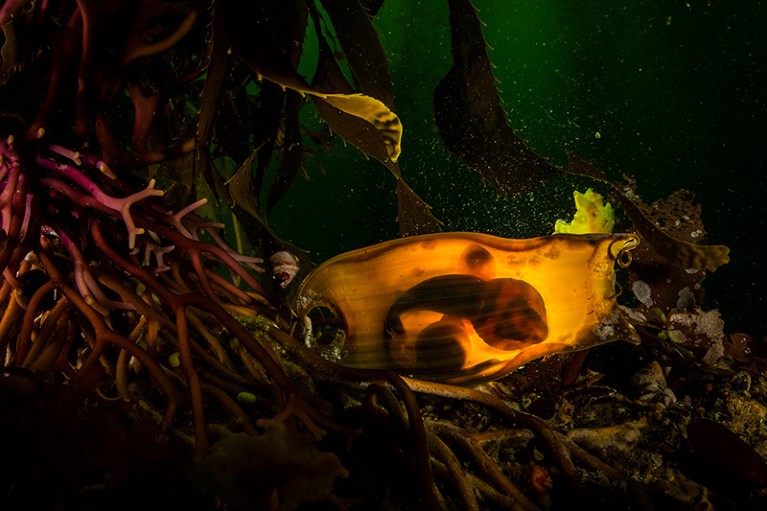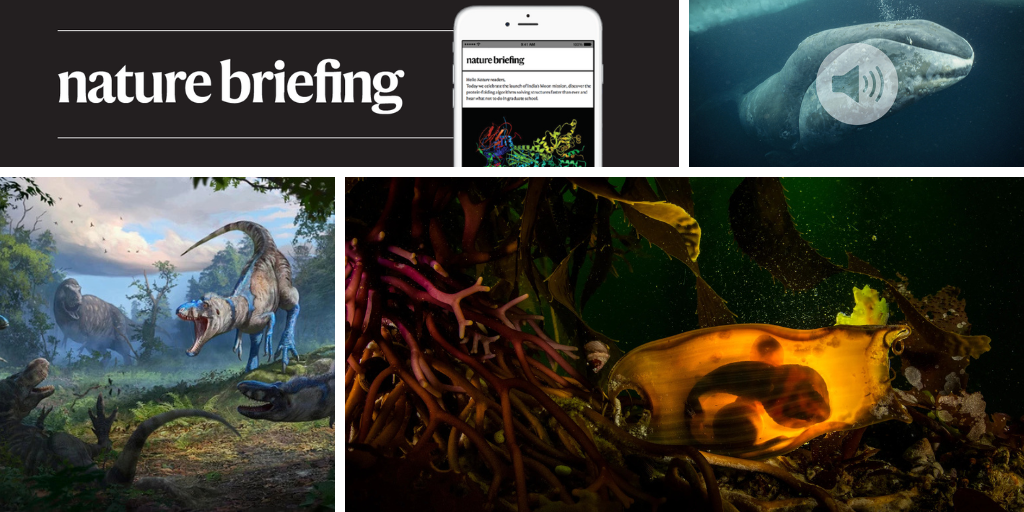You have full access to this article via your institution.
Hello Nature readers, would you like to get this Briefing in your inbox free every day? Sign up here.

Credit: Ralph Pace/Wildlife Photographer of the Year
This serene shot of an egg case of a swell shark (Cephaloscyllium ventriosum) tethered to the base of a giant kelp won in the Underwater category of the National History Museum’s Wildlife Photographer of the Year competition. In the waters of Monterey Bay, California, photographer Ralph Pace lit the egg case from behind to reveal the embryo within. The decline of kelp forests in the bay put the population of swell sharks at risk, as the species relies on the plant to lay their eggs.
See more of the month’s sharpest science shots, selected by Nature’s photo team.
A fossil once assumed to be of a young Tyrannosaurus rex is in fact that of a fully grown adult of a different species altogether. The species, christened Nanotyrannus, is about half the length and one-tenth of the body mass of its larger cousin. The specimen also has distinct physical features such as longer arms and sharper, less curved teeth than T. rex. The classification of Nanotyrannus is a “mic drop”, says palaeontologist Steve Brusatte. “And that necessitates a fundamental reassessment of tyrannosaur classification and evolution.”
Artificial intelligence (AI) chatbots trained on ‘brain rot’ content — vapid social media posts that are the equivalent of mental junk food — are worse at generating accurate information. Researchers found that chatbots given a diet of popular and sensationalist Twitter/X posts skipped steps in their reasoning process (or didn’t use reasoning at all), spat out wrong answers and demonstrated ‘dark traits’ such as psychopathy and increased levels of narcissism.
Reference: arXiv preprint (not peer reviewed)
Question of the week
Last week, we asked you what’s the best science-themed gift you’ve ever received. I mentioned a favourite book of mine, and many of the readers who replied to our question also recalled well-loved books — including two shout-outs to thesauruses. It made me ponder what today’s young people might best remember in a few decades’ time. Several readers also told of times when an adult shared their own love of science — on a nature walk, for example. I enjoyed the reminder that giving our time and attention can be a more welcome gift than anything from a shop. I’m sure that will never change.
Thanks to everyone who replied — stay tuned for a Nature story that will explore some of scientists’ most-loved gifts.
Features & opinion
With autonomous weaponry on the rise, some experts fear that humanity is at risk of an arms race that could lead to machines with the power to decide when and whom to kill. Besides the risk of robots running amok, such weapons could undermine the principles that underlie the rules of war. “If humans delegate decisions to autonomous weapons, they might feel less morally responsible if the systems attack civilians or cause excessive collateral damage and deaths,” suggests Paul Scharre, a security analyst and former soldier. Legal scholar Nehal Bhuta agrees. “There is a risk that accountability becomes so diffuse that it’s hard to identify the individuals or groups of agents responsible for violations and failures.”
Nature | 6 min read & Nature | 7 min read
Read more in Nature Spotlight: Robotics or subscribe to Nature Briefing: AI & Robotics.
The last native Japanese speaker finds that they can archive their language, but not its essence in Komorebi and an archaeological park sets very clear boundaries for guests’ safety in Please stay out of the abandoned buildings.
Nature | 7 min read & Nature | 5 min read
Andrew Robinson’s pick of the top five science books to read this week includes a deep dive into the complexity of brain disorders and a map of our current understanding of the Solar System.
A cold-activated protein that helps to repair broken DNA could be the bowhead whale’s secret to living sometimes for more than 200 years. “Many people would say, ‘Oh, well, we already have DNA repair. We can’t really make it any better.’ But the whale teaches us that it is possible,” biologist and study co-author Vera Gorbunova tells the Nature Podcast.
Nature Podcast | 23 min listen
Subscribe to the Nature Podcast on Apple Podcasts, Spotify or YouTube Music, or use the RSS feed.
Today Leif Penguinson is ghost hunting in a spooky spot in Wistman’s Wood, a supposedly haunted temperate rainforest in Devon, United Kingdom. Can you find the penguin?
The answer will be in Monday’s e-mail, all thanks to Briefing photo editor and penguin wrangler Tom Houghton.
This newsletter is always evolving — tell us what you think! Please send your feedback to [email protected].
Thanks for reading,
Flora Graham, senior editor, Nature Briefing
With contributions by Jacob Smith
• Nature Briefing: Careers — insights, advice and award-winning journalism to help you optimize your working life
• Nature Briefing: Microbiology — the most abundant living entities on our planet — microorganisms — and the role they play in health, the environment and food systems
• Nature Briefing: Anthropocene — climate change, biodiversity, sustainability and geoengineering
• Nature Briefing: AI & Robotics — 100% written by humans, of course
• Nature Briefing: Cancer — a weekly newsletter written with cancer researchers in mind
• Nature Briefing: Translational Research — covers biotechnology, drug discovery and pharma


